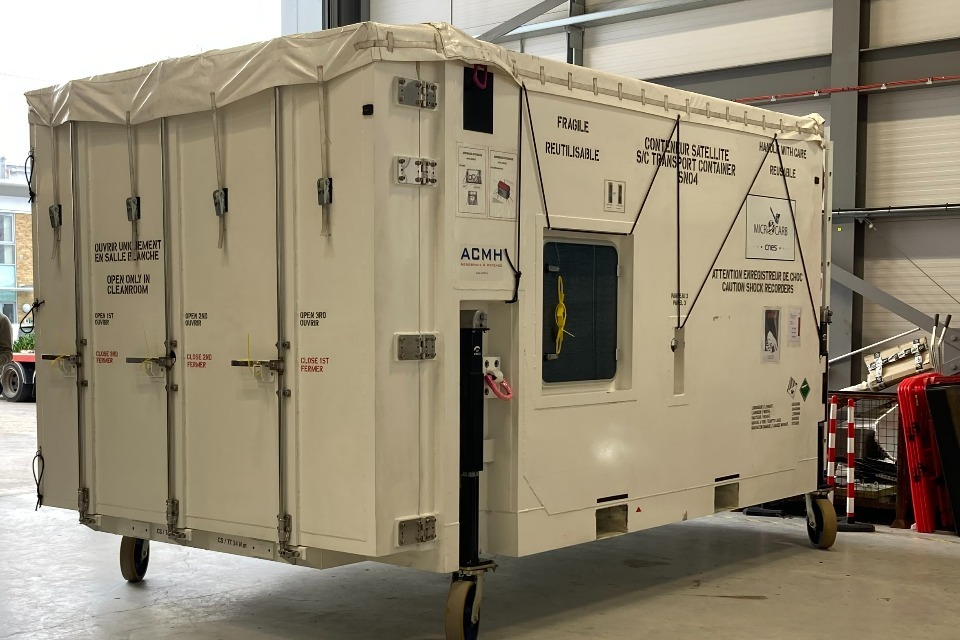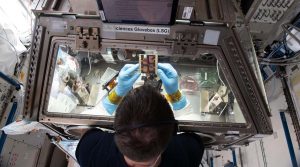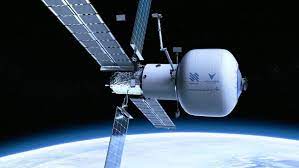The UK’s MicroCarb CO2 Satellite Ready For Launch
13th Feb 2024
The UK and Europe’s MicroCarb satellite is ready for orbit. The satellite will monitor global greenhouse gas emissions to identify the amount of carbon absorbed by Earth’s atmosphere. Data from it will inform government and business decisions on how they should approach climate change and CO2 reduction.
MicroCarb: joint efforts for global CO2 monitoring
Altogether, UK organisations, RAL Space, the UK Space Agency (UKSA) and Thales Alenia Space (TAS) UK, were joined by TAS’s parent European arm, CNES and Airbus. MicroCarb is now journeying back to Europe, after finalising testing and assembly in England. It will remain in France until a launch date is set – which is forecasted for some time in 2025.
UKSA CEO, Dr Paul Bate, commented: “MicroCarb’s departure to France is an exciting next step in its journey to space, where it will gather crucial information to improve our understanding of the carbon landscape on our planet and the impact of carbon dioxide, which is the main greenhouse gas caused by human activity.”
He continued: “Over half of the critical measurements on climate change rely on satellite data and it’s a testament to the expertise of UK scientists and engineers – both at Harwell Space Cluster and across the country – that we are playing a central role in such an important mission.”
What MicroCarb Satellite Will Measure
Once operational, MicroCarb will monitor and collect granular data to identify the amount of CO2 in the atmosphere. UKSA said in a statement: “The satellite is designed to quantify sources and sinks of carbon dioxide”. Currently, there is meagre data capturing equipment available to measure the amount of pollutants effused. Therefore, UKSA said the satellite will be “vital to gain deeper insights into natural carbon fluxes and inform climate models.”
Once data capturing begins, the “compact technology” onboard will allow scientists to evaluate the “concentrations of CO2… with a high degree of precision”. That being, approximately one molecule per one million molecules of dry air, UKSA said. To complete the scientific measurements, MicroCarb will use a passive spectrometer. At length, it will capture details of how CO2 influences ecosystems, and in turn, how that influence impacts climate change.
The Collaboration Between Europe & The UK
The feat marks a significant European – and UK – milestone achievement. UKSA said: “The mission [is] a major step for Europe towards establishing a system to monitor global CO2 fluxes.” In 2019, the ESA surveyed their member states; they expressed that space needed to be used to combat climate change. With that in mind, MicroCarb will enable great ability to address the amount of pollutants soaked up in the atmosphere.
Initially, CNES received direction from the French government to deliver a MicroCarb satellite. The project was then adopted by UKSA and the European Union, with UKSA injecting £13.9 million into the mission. Thereafter, Airbus was tasked with the design and build phases at their Toulouse facility. They constructed the instrument in addition to its cocooning Myraide microsatellite bus.
Testing & Assembly In The UK, Delivery To France
After Airbus completed construction, the satellite was delivered to RAL Space’s test centre. That being, the Harwell Science and Innovation Campus in Oxfordshire. Arriving in December 2022, RAL then proceeded to design, qualify and deliver the satellite pointing and calibration system.
From then on, RAL and TAS UK finalised MicroCarb’s assembly and tests, which culminated in successfully ascertaining clearance to launch. Testing phases comprised “a series of vibration and thermal vacuum tests; the last stage of environmental testing before verifying its propulsion system.” Now that the satellite is prepared for orbit, it has been shipped back to France. Whilst the satellite awaits a launch date, it will be stored in TAS’ Toulouse warehouse.
Minister for Space at the Department for Science, Innovation and Technology, Andrew Griffith, concluded: “MicroCarb’s advanced technology will deliver invaluable and precise data on our planet’s carbon dioxide levels and marks the latest exciting innovation by the UK’s ground-breaking space sector in collaboration with our friends in France.
“Once operational it will inform businesses and decision-makers around the world on the role they can play in tackling climate change and as the technology develops, open new avenues for UK businesses that grow our economy.”







Thank you for your comment! It will be visible on the site after moderation.